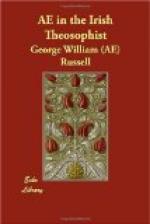He found himself in a small square; he sat down on a bench; his brain burning, his eyes unseeing.
“Oh! my, what’s he piping over?” jeered a grotesque voice, and a small figure disappeared, turning somersaults among the bushes.
“Poor young man! Perhaps he is ill. Are you not well, sir?” asked a sympathetic nurse.
He started up, brought to himself, and muttering something unintelligible, continued his journey through the city. The terrible influence departed, and a new change came over him. The laugh of the urchin rankled in his mind: he hated notice: there must be something absurd or out of the common in his appearance to invoke it. He knew suddenly that there was a gulf between him and the people he lived among. They were vivid, actual, suited to their places. How he envied them! Then the whole superficies of his mind became filled with a desire to conceal this difference. He recalled the various characteristics of those who worked along with him. One knew all topical songs, slang and phrases; another affected a smartness in dress; a third discussed theatres with semi-professional knowledge. Harvey, however, could never have entered the world, or lived in it, if he had first to pass through the portals of such ideas! He delivered his letter; he was wearied out, and as he returned he noticed neither sky nor sunlight, and the hurrying multitudes were indifferent and without character. He passed through them; his mind dull like theirs; a mere machine to guide rapid footsteps.
That evening, a clerk named Whittaker, a little his senior in the office, was struck by Harvey’s curious and delicate face.
“I say, Harvey,” he said, “how do you spend your evenings?”
Harvey flushed a little at the unwonted interest.
“I take long walks,” he said.
“Do you read much?”
“A little.”
“Do you go to the theatre?”
“No.”
“Never?”
“Never.”
“Whew! what a queer fellow! No clubs, classes, music-halls— anything of the sort, eh?”
“No,” said Harvey, a little bitterly, “I know nothing, nobody; I am always alone.”




